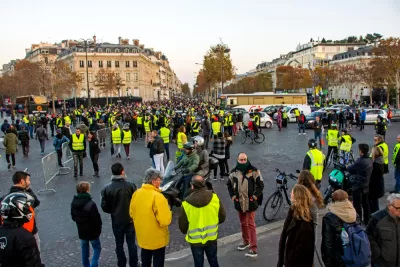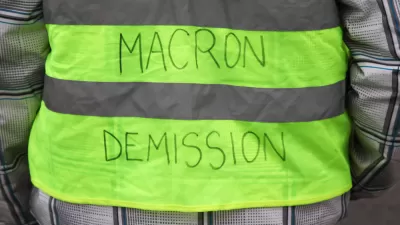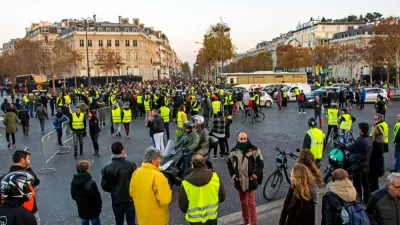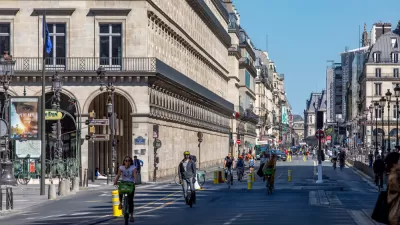Controversial London-style congestion pricing won't be coming to French cities due to concerns sparked by the 'Yellow Vest' protests over an upcoming fuel tax hike, but President Macron stated the fuel tax increases will go forward in January.

"Last month, Transport Minister Elisabeth Borne said a new law on mobility would allow cities to introduce congestion pricing in a bid to cut traffic jams and pollution," reports Geert De Clercq for Reuters on Nov. 26.
But in the past two weeks, France has seen nationwide protests against rising fuel costs, with demonstrators clad in fluorescent jackets - dubbed “yellow vests” - blocking highways and setting up barricades, hoping to force the government to row back on new taxes on petrol and diesel.
Cordon area congestion pricing, as practiced in London, Stockholm and Singapore, is a proven strategy to reduce traffic congestion, air pollution and improve traffic safety and increase use of public transit within the cordoned area.
"But the politics of congestion pricing are tricky — the new tolls stir opposition, while the benefits aren’t immediately apparent until the policy is in effect," wrote Streetsblog USA's Angie Schmitt in April about just such an attempt in Seattle.
“The perception is that this measure would create new territorial divides, and hence it will not be part of the draft law,” stated Borne on Nov. 26.
“France created a legal framework for urban tolls a decade ago, but it was so restrictive that no cities have used them," reported De Clercq earlier.
"The mayor of Paris, Anne Hidalgo, has repeatedly opposed a congestion charge in the capital, and Toulouse and Marseille have also expressed blanket opposition" according to the BBC (posted here.).
Macron stands firm on fuel tax hikes
"In a speech on Tuesday, French President Emmanuel Macron said he sympathizes with the protesters and offered some conciliatory gestures, but stood firm on the tax that prompted the anger," reports Camila Domonoske on Nov. 27 for NPR.
As posted Nov. 26, come January, "gas taxes will rise by €0.029 per liter ($0.12 a gallon) and taxes on diesel—a fuel once heavily promoted in France that is now being proactively phased out—will rise to €0.065 a liter ($0.24 a gallon). These taxes come on the heels of already steep rises in fuel costs over the past few years."
While the tax increases are modest, they come on the heels of other fuel tax hikes in the past few years. By contrast, the U.S. gas tax of 18.4 cents per gallon hasn't been increased since 1993.
"At more than $6 a gallon, the French already pay some of the highest prices for gasoline," reports NPR's Eleanor Beardsley from Paris on Nov. 23. "Sixty percent of the pump price is taxes, and now, the government wants to raise them to finance the country's transition to a green economy."
That doesn't fit well with those who are protesting, which include "retirees and the unemployed, farmers, housewives and people who have never protested before," adds Beardsley.
"There are two Frances: There are the better off people who live in the cities who can afford to think about climate change, and then those living in the rural areas and small towns, a lot of blue collar workers, [who] can't make ends meet," Beardsley says.
Concessions offered
Macron stated that the tax hikes would be adjusted downwards should oil prices rise, and financial incentives will be offered to purchase greener vehicles, but he wouldn't budge on the taxes themselves.
"What I've taken from these last few days is that we shouldn't change course because it is the right one and necessary," he said, according to a translation by The Local.
Domonoske points out that Macron is also "facing pressure from environmental groups who say he's not sufficiently committed to fighting climate change."
Related in Planetizen:
Hat tip to Streetsblog California.
FULL STORY: France drops plan for urban tolls amid fuel price protests

Alabama: Trump Terminates Settlements for Black Communities Harmed By Raw Sewage
Trump deemed the landmark civil rights agreement “illegal DEI and environmental justice policy.”

Study: Maui’s Plan to Convert Vacation Rentals to Long-Term Housing Could Cause Nearly $1 Billion Economic Loss
The plan would reduce visitor accommodation by 25% resulting in 1,900 jobs lost.

Planetizen Federal Action Tracker
A weekly monitor of how Trump’s orders and actions are impacting planners and planning in America.

Wind Energy on the Rise Despite Federal Policy Reversal
The Trump administration is revoking federal support for renewable energy, but demand for new projects continues unabated.

Passengers Flock to Caltrain After Electrification
The new electric trains are running faster and more reliably, leading to strong ridership growth on the Bay Area rail system.

Texas Churches Rally Behind ‘Yes in God’s Back Yard’ Legislation
Religious leaders want the state to reduce zoning regulations to streamline leasing church-owned land to housing developers.
Urban Design for Planners 1: Software Tools
This six-course series explores essential urban design concepts using open source software and equips planners with the tools they need to participate fully in the urban design process.
Planning for Universal Design
Learn the tools for implementing Universal Design in planning regulations.
Caltrans
Smith Gee Studio
Institute for Housing and Urban Development Studies (IHS)
City of Grandview
Harvard GSD Executive Education
Toledo-Lucas County Plan Commissions
Salt Lake City
NYU Wagner Graduate School of Public Service





























